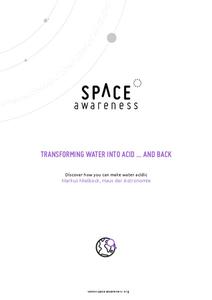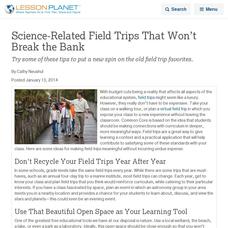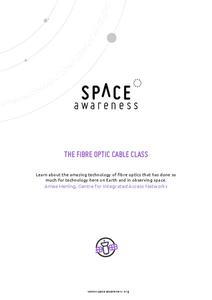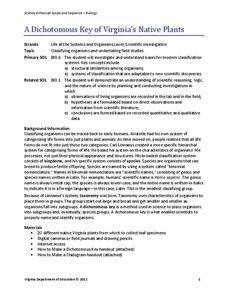Curated OER
Get the Picture!
Astronomers practice downloading data from a high-energy satellite and translate the data into colored or shaded pixels. As a hands-on activity, they use pennies to simulate high-energy satellite data and they convert their penny...
Laboratory for Atmospheric and Space Physics
Planetary Distances on the Playground
There's no need to stay inside; get out of the classroom and create a scaled map of the solar system on your playground field! In collaborative groups, scholars identify the distance between the sun and other planets, place planet...
Inside Mathematics
Winning Spinners
Winning a spin game is random chance, right? Pupils create a table to determine the sample space of spinning two spinners. Individuals determine the probability of winning a game and then modify the spinners to increase the probability...
University of Colorado
The Jovian System: A Scale Model
Jupiter has 67 moons! As the seventh in a series of 22, the exercise shows learners the size and scale of Jupiter and its Galilean moons through a model. They then arrange the model to show how probes orbited and gathered data.
NASA
NASA: Moving Cargo
How does NASA transport people and cargo to planets? The five-lesson unit breaks down the transportation system that scientists use to transport cargo to space. Pairs team up in order to devise a transportation system that will carry the...
University of Wisconsin
Infiltration Test: Exploring the Flow of Water Through Soils
Soil scientists gain experience with an infiltrometer can to determine the infiltration rates at different locations on campus. If you are using the entire unit, the class has already analyzed water flow and soil types, so they should...
Curated OER
Constellations
Young scholars investigate the concept of the constellations using many different resources to find information. Then students use the information in order to construct models of the constellations that show the magnitude of their size...
NASA
Engineering Design for Human Exploration
What would it take to live on the lunar surface? Small groups build model rockets in order to simulate launching a habitat into space and rebuilding it. Divide the class into groups to design and build a model of a lunar habitat. The...
Space Awareness
Transforming Water Into Acid ... And Back
Greenhouse gases affect marine wildlife in life-threatening ways. Through experimentation, your classes explore the acidification of water from the main greenhouse gas carbon dioxide. As they introduce carbon dioxide to water, a pH...
Curated OER
Science-Related Field Trips That Won’t Break the Bank
Try some of these tips to put a new spin on the old field trip favorites.
Laboratory for Atmospheric and Space Physics
A Classroom Solar System
Create a scaled model of our solar system in your classroom! Scholars work collaboratively to build paper mache planets and hang them in their proper position to showcase each planet's location in the solar system.
Space Awareness
Making A Sundial
Can people really measure time just by using the sun? Scholars venture outside on a nice, sunny day to build sundials and learn how people measured time 600 years ago. The class builds two different sundials while gaining practice with...
Space Awareness
Let's Break the Particles
Build learning by breaking atoms! Young scientists study the way energy changes with a hands-on activity. As they roll steel marbles down a ramp, learners test the hypothesis that kinetic energy does not go away with friction or...
Space Awareness
The Fibre Optic Cable Class
Many people know that fiber optics are used in delivering the Internet, but are surprised to learn they are also used in astronomy. Scholars explore light, reflection, and fiber optics through hands-on activities. They discuss methods of...
Virginia Department of Education
Weather Patterns and Seasonal Changes
Get your class outside to observe their surroundings with a lesson plan highlighting weather patterns and seasonal changes. First, learners take a weather walk to survey how the weather affects animals, people, plants, and trees during...
Space Awareness
Fizzy Balloons - C02 in School
Carbon dioxide is a very important gas; it is present in the air, used in cooking, and supports plant and animal life. Scholars investigate the properties of carbon dioxide with three different activities. They experience a color change,...
Curated OER
Covalent and Ionic Bonding:Electron Dot Structures with Ionic Notation
After drawing the valence electron distribution of 13 basic elements, there are spaces to draw 18 more complicated molecules. For each molecule, there is space for a Dot structure and Lewis structure that best describes the distribution...
National Wildlife Federation
Watershed Web: A Field Trip
Observing plant succession doesn't have to be a decade long process. A hands-on instructional activity has groups study succession over a designated space. Learners use their observation skills to record differences in plant and soil...
K12 Reader
A Planet in the Solar System
Take young scientists on an exploration of the cosmos with this cross-curricular writing exercise. Tasked with producing an expository composition describing a planet of their choosing, students perform research and present their...
Las Cumbres Observatory
Astronaut Training: Taste
Gravity isn't the only thing astronauts lose in space. Learners investigate why astronauts complain about a loss of taste while in space in a hands-on activity. They taste test foods while limiting their other senses and rate each food...
Virginia Department of Education
A Dichotomous Key of Virginia’s Native Plants
Can your class correctly classify plant species? Individuals explore native plants of the local environment and correctly classify them into their respective categories. They investigate differences in the plants and discuss similarities...
Star Wars in the Classroom
Star Wars Geography Unit
What kind of animals live on an ice planet like Hoth? How would the habitat on Tatooine allow different organisms to thrive? Connect social studies, science, and Star Wars in one engaging activity that focuses on the ecosystems of the...
Space Awareness
Britannia Rule the Waves
Could you determine longitude based on measuring time? Early explorers used a longitude clock to do just that. Scholars learn about early exploration and the importance of the invention of the clock. Then pupils build their own longitude...
Space Awareness
Navigation in the Ancient Mediterranean and Beyond
Ancient texts, like Homer's Odyssey, mentions navigating ships by observing constellations. Pupils learn about the link between history and astronomy as they relate to navigation in the Bronze Age. Scholars complete two hands-on...
Other popular searches
- Science Space
- Astronomy and Space Science
- Physical Science Space
- Earth and Space Science
- Science Space Experiment
- Space Science Vocabulary
- Science Space Lessons
- Space Science Astronomy
- Science Space Race
- Star Maps Science Space
- Earth Space Science
- Science Space Station

























